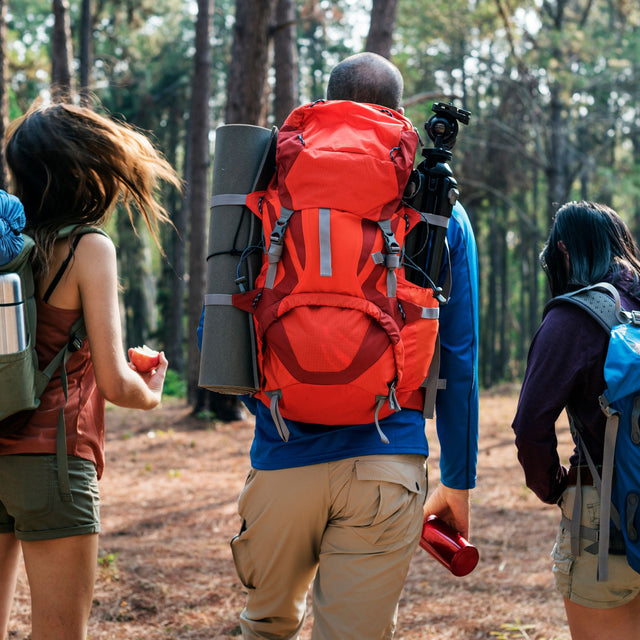Hiking Gear Weight: How Much Can I Carry?
One of the most common questions in the hiking community is how much weight I can and should carry.
Finding the right balance has always been tricky because it differs from person to person and depends on your adventure.
However, we have a few general guidelines for you to follow.
Understanding Pack Weight Categories
Hikers typically categorise their load in base weight—the weight of your pack and gear, excluding consumables like food, water, and fuel. For most hikers, pack base weight falls into these ranges:
-
Ultralight backpacker: Under 4.5 kilograms
-
Lightweight backpacker: 4.5-9 kilograms
-
Traditional backpacker: 9-13.5 kilograms
Your personal preference and physical condition will determine where you fall on this spectrum. A good rule of thumb is to keep your total pack weight under 20-25% of your body weight. This rule is generally considered optimal for comfort and safety.
Choosing the Right Backpack
Weight distribution and comfort should be the number one factor when choosing a backpack. Naturehike offers several options that cater to different hiking styles and weight categories:
-
The Naturehike 60L/70L Hiking Backpack features an ergonomic design with an adjustable torso length system, making it ideal for traditional backpackers carrying more gear on longer journeys.
-
For lightweight backpackers, the Naturehike 45L/55L Hiking Backpack provides sufficient space while maintaining a lighter profile. Its durable yet lightweight materials make it a great option.
-
Ultralight enthusiasts might prefer the Naturehike 40L Ultralight Hiking Backpack, which emphasises minimalism without sacrificing functionality through its streamlined design and water-resistant construction.
These packs also include features like multiple compartments, hydration compatibility, and ventilated back panels that enhance comfort without adding unnecessary weight.
Essential Gear vs. Extra Weight
Focus on necessities first when going through your gear list:
-
Shelter: Lightweight tents or tarps
-
Sleep system: Appropriate sleeping bag and sleeping pad
-
Kitchen: Compact stove and fuel canister
-
Hydration: Water bottles
-
First aid kit: Basic medical supplies
-
Navigation: Map, compass, or GPS
-
Weather protection: Rain jacket and warm layers
Many hikers add unnecessary extra weight by packing too many "just in case" items. Remember that every gram matters on a long hike! A simple trash bag can serve multiple purposes while adding negligible weight.
How to Reduce Your Pack Weight
Knowing your base weight (pack weight minus consumables) is the first step to lightening your load. Use a kitchen or luggage scale to weigh all gear, which helps identify items to replace with lighter alternatives.
Focus initially on upgrading your "big four": pack, sleeping bag, sleeping pad, and tent. These offer the most significant weight-saving potential. After each trip, evaluate what you rarely use and consider eliminating these items next time.
Meal planning is crucial, with most hikers aiming for 0.7-1.1 kg of food per person daily. Repackaging toiletries and food into lightweight containers eliminates unnecessary packaging weight. A comprehensive packing list prevents bringing superfluous items while sharing standard equipment like tents, stoves, and water filters, distributing weight among hiking partners.
One thing to remember is never to trade out necessities. Your health and safety come first before that extra chocolate you want to bring along. With your Naturehike backpack, you're all set to go on a long or short trip!
The Big Three: Where to Invest Your Money
The heaviest items in your pack are typically your shelter, sleeping system, and backpack—collectively known as the "Big Three." Investing in lightweight, durable versions of these items can significantly reduce your base weight:
-
A quality ultralight tent
-
A down sleeping bag appropriate for your conditions
-
A well-fitting backpack
While these items may cost more, their comfort on the trail is worth the investment for many hikers.
Food and Water: The Variable Weight
Unlike your base weight, consumables vary depending on trip length. Food typically weighs 0.7-1.1 kilograms per person per day. Water is heavy at 1 kilogram per litre, so plan water carried carefully based on available sources along your route.
Most hikers aim to carry no more than 2-3 days of food at once when possible, resupplying along their journey to keep pack weight manageable.
Naturehike's backpacks feature convenient side pockets and attachment points specifically designed for water bottles and hydration systems, making water management more efficient on the trail.
Pack For Your Next Trip with Naturehike
Are you ready to lighten your load and tackle that trail you've planned on taking?
Naturehike's range of hiking packs accommodates different carrying capacities, allowing you to scale up or down depending on your evolving needs and experience level.
Browse our collection of premium hiking gear to take on your next trip!



0 Comments
There are no comments for this article. Be the first one to leave a message!